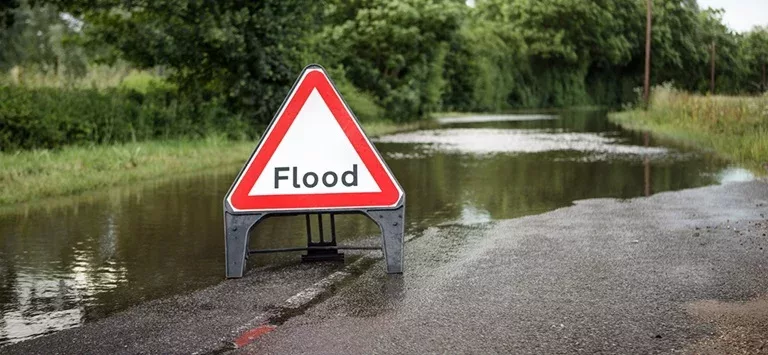Local authorities in England are grappling with hundreds of compensation claims for flash floods, as central government budget cuts leave councils struggling to upkeep local roads and ageing drainage systems.
Between January 2020 and December 2022, councils received 740 claims from property owners for flood damage caused by sudden downpours. Councils accepted liability in 128 cases, paying out more than £975,000.
The analysis* by public sector insurer, Zurich Municipal, relates to 139 of the 318 local authorities in England – suggesting the true cost to taxpayers is likely to be far higher.
Many claims received by councils involve flood damage from blocked gutters, gullies and culverts. As the authority responsible for local highways, councils can face hefty claims if they are found not to have fulfilled their duty to adequately maintain them.
Some property damage claims can run into tens of thousands of pounds. To August this year alone, Zurich Municipal has set aside £368,000 for 112 claims.
Zurich Municipal claimed cuts in central government highways funding is exacerbating the issue, with townhalls forced to stretch shrinking budgets to carry out road repairs and maintenance.
A recent analysis of OECD figures by the Local Government Association found that £4 billion was spent in 2006 on UK local road maintenance, compared with just £2 billion in 2019 – the last year of comparable data available.
The findings come as towns and cities throughout the country experience repeated episodes of flash flooding, caused by extreme weather.
Experts warned claims could escalate in coming years, due to a combination of deteriorating roads, ageing drainage systems, and more frequent torrential rain from climate change.
Alix Bedford, a risk expert at Zurich Municipal, said: “Well-maintained roads and drainage systems are vital for managing heavy rainfall, and mitigating the risk of flash flooding.
“Reduced funding from central government is making it increasingly challenging for councils to repair and maintain local highways.
“While potholes are a visible result of the budget shortfalls impacting townhalls, a less apparent yet potentially more devastating consequence is flash flooding.
“Ministers need to recognise the far-reaching impact of a lack of investment in local highways, and do more to help councils ensure roads and drainage systems can cope with torrential rain, especially as our climate changes.
“With a general election now on the horizon, we urge all parties to commit to invest in the local road network as part of their manifesto pledges.”
RAC head of policy, Simon Williams, said: “This is yet more evidence – if it were needed – that the state of many of the UK’s local roads has reached crisis point with local authorities unable to adequately look after their networks.
“We desperately need the Government to look into how it funds these most vital of assets and give councils the certainty of longer-term funding so they can bring them up to a far better state of repair. This is something we have raised with both the roads minister and Secretary of State for Transport in recent months. While drivers regularly experience the consequences of poor road surfaces, homeowners can also suffer unacceptable flooding due to inadequate or poorly maintained roadside drainage.”
Alice Wilson, a partner in the UK property damage team at law firm, Weightmans, said: “The question of the precise scope of a local authority’s duty of care in respect of the inspection and maintenance of an often ageing drainage infrastructure will require some clarification by the courts. At present, we see frequent disagreements between parties’ experts when it comes to the precise steps a local authority should follow in order to discharge its duty.
“In the coming months and years it is vital that the courts provide clear guidance on the issue of whether, as a matter of public policy, it is fair, just and reasonable to expect local authorities to expend potentially significant funds to mitigate the impact of the increase in frequency of incidents of flash flooding; especially in the present climate of central government cuts to local authority spending.”
Richard Hayes, past president of the Institute of Highway Engineers, said: “The squeeze on council budgets is horrendous, which has led to a reduction in road maintenance overall. If we can’t keep roads clear of debris, which causes blocked drains, and do less pipework maintenance, then in severe weather the system becomes overloaded almost immediately.
“When budgets are so tight, it’s not popular to say ‘we want to sweep more roads’. We’re now seeing the cumulative impact of decades of underfunding, and short-term repairs that don’t add value to the road infrastructure.
“We’re heading for a critical time of the year. When leaves start to fall, and channels and gutters are covered in leaves, maintenance regimes are even more important to keep those clear.”
In the same way as gritter lorries lay salt on road networks ahead of icy weather, Zurich Municipal said councils could establish rapid response teams to clear gutters and gullies in flood-prone neighbourhoods ahead of forecast storms.
Zurich Municipal has invested in a cutting-edge, flash flood forecasting system developed by fintech company, Previsico, which could help identify communities at risk. The service, provided free to Zurich’s local authority customers, delivers precise flash flood warnings to within 25 metres of an individual property, up to 48-hours in advance enabling targeted response plans to be enacted.
Following its launch in 2022, 98 public bodies have already signed up to receive the early warning alerts, helping to protect over 415,000 community assets, from social housing to schools.
Bedford added: “Using new technology to forecast flash floods could help councils deploy teams of operatives to blitz gutters and gullies in flood prone communities, ahead of severe weather.
“By taking pre-emptive action, councils can reduce the likelihood of flood damage and disruption for residents and businesses, as well as the risk of costly legal action and claims.”
Wilson, concludes: “Notwithstanding budgetary constraints, there are some practical steps local authorities can take in order to protect their position. We often see cases where a local authority’s potential defence to a claim is undermined by a lack of contemporary records of maintenance and inspection regimes and notes recording the local authority’s decision making process. Simple checks and balances to ensure good record keeping would be well worth putting in place.”
























